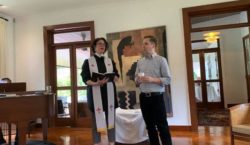
In the latest issue of NYT, the Embassy of Denmark in Bangkok speaks about the importance of having a Danish priest in Thailand and touches down on some of the hard times where the priest makes a difference for Danes in Thailand and relatives in Denmark.
Alice Rosengren Skov is the consul at the Embassy of Denmark in Bangkok which also covers Cambodia and is one of Denmark’s busiest embassies. Alice Rosengren Skov explains that the consular department’s primary task is to assist Danes in Thailand which includes everything from issuing passports to heavier consular cases. Those heavy cases are primarily the deaths of Danes in Thailand. Alice says that 1-2 Danes die on average a week in Thailand, even during the pandemic. “We usually see a lot of traffic and drowning accidents. However, the largest proportion of deaths is most often seen among older generations of Danes residing in Thailand,” she says.
The embassy is responsible for the more practical aspects of death. Apart from dialogue with relatives about practical matters, the Embassy does not have the resources or competencies to handle the great emotions that may be at play. It can be difficult for relatives, and it is a resource for the embassy to be able to refer to the Danish priest, who can enter into a different kind of dialogue with the family, Alice explains.
According to Alice, it is obvious to have a priest on-site in Thailand because there are so many heavy matters. She says that the priest has a way with conversation and she has witnessed the priest help solving difficult cases between parties of the conflict in a very good way. She also points out that too many Danes in Thailand are not covered by insurance which often results in large hospital bills. Alice explains that most Danes are cremated in Thailand according to Buddhist precepts but the Embassy does see approximately 10 cases where no relatives claim the deceased.
Prison cases are also amongst the heavy cases and the Embassy is very happy with the priest’s effort in these cases. “In some cases, the priest has taken the place of the Embassy, but the starting point is that the visits from the priest are a supplement, ” Alice says. “Since the pastor can also reach out to relatives in Denmark, they can get more frequent information about how their loved ones are doing,” Alice says.
The priest and the Embassy also keep each other informed about distressed Danish inmates in Thailand, within the framework of their duty of confidentiality. They meet every 3 weeks and talk to each other regularly. The priest has also provided supervision to the embassy’s consular staff, who are affected by the encounter with the sometimes harsh fates that the work brings, Alice says.
Read the full interview with Alice Rosengren Skov in the latest issue of NYT here




